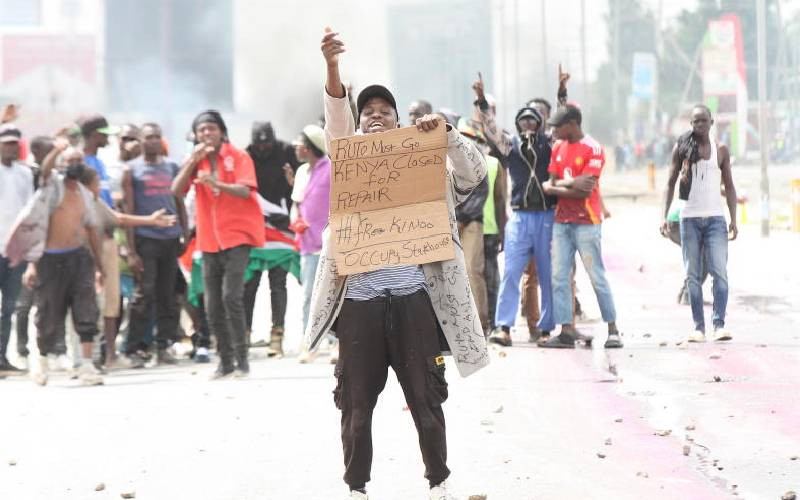LSK President Faith Odhiambo and Amnesty International Kenya Executive Director Houghton Irungu were appointed members of the Panel of experts on compensation of victims of protests. [File, Standard]
In recent weeks, much noise has been made about the panel, appointed by the President, to design compensation modalities for victims of state violence. Some in civil society have rushed to embrace it, among them Faith Odhiambo, the President of the Law Society of Kenya, and Irungu Houghton, a long-time human rights advocate. Both are respected voices, yet their faith in this exercise betrays a dangerous naivety.
At its core, the panel is not anchored in law, has no constitutional authority, and lacks a funding framework. It is, therefore, not just inadequate. It is a deliberate distraction from the real path to justice.
No individuals, however well-meaning, can single-handedly defeat a dysfunctional system. Our country is littered with the remains of commissions, task forces, and panels that consumed public attention and resources but delivered little more than reports that gathered dust on government shelves.
Follow The Standard
channel
on WhatsApp
Think of the Truth, Justice and Reconciliation Commission (TJRC), which spent more than Sh1 billion collecting testimonies of victims of State violence, only for its report to be shelved by Parliament. Or the Waki Commission on the 2007/08 post-election violence, whose powerful recommendations on accountability were buried to protect the political class. Or the Krigler Commission, which investigated electoral failures and made strong proposals, most of which remain unimplemented.
These commissions were created by law, staffed with experts, and backed by international support. Yet they still failed to deliver justice. How, then, can anyone expect a presidential panel without a legal foundation, budget, or independence to succeed?
Justice is the exclusive domain of the Judiciary, not of presidential appointees. Courts have the mandate to establish responsibility, to hold perpetrators accountable, and to award compensation to victims. By creating a parallel structure under the control of the Executive, the very organ implicated in State violence, the President has arrogated unto himself judicial powers that are not his to exercise.
Even if we were to suspend disbelief and assume that the panel has good intentions, a basic and practical question arises: What funds will it use to compensate victims?
Compensation is not rhetorical; it is financial. It requires budgetary allocation approved by Parliament and implemented transparently.
The panel has no appropriation power. The President cannot simply dip into the Consolidated Fund at will. Without a legal framework, any compensation scheme will amount to arbitrary payments. If they happen at all. And arbitrary payments risk degenerating into yet another patronage tool: Selective generosity for some victims, silence and neglect for others.
If the State is serious about compensating victims, let it submit a supplementary budget to Parliament, backed by a clear policy anchored in law. Anything less is deception.
There is a deeper absurdity here. The violence in question was meted out by the State, often under the President’s own command structures. Police, military, and intelligence officers do not deploy themselves. They act under executive authority.
To now ask a panel appointed by the same presidency to investigate and compensate victims is a mockery of justice. It is akin to allowing the accused to sit as judge in his own case. The principle of nemo judex in causa sua (no one should be a judge in their own cause), is not just legal jargon. It is the foundation of fairness.
Ms Odhiambo and Mr Houghton, by lending their credibility to this charade, risk laundering impunity under the guise of reconciliation. They should know better. The only legitimate path is courts and Parliament. Kenya has clear pathways for victims of State violence. The courts have repeatedly ruled that victims are entitled to compensation and have issued orders against the State. The problem has never been the absence of judicial mechanisms, but rather the refusal of the Executive to honour court awards.
Instead of chasing panels to nowhere, civil society should focus on strengthening judicial independence, enforcing compliance with court orders, and demanding that Parliament ring-fences funds for victim compensation. The Constitution already provides the tools; what is lacking is political will.
Anything else, especially presidential panels, undermines the Judiciary and normalises the idea that justice is a matter of presidential benevolence rather than a constitutional right.
This is a political cover-up disguised as benevolence. We must be honest about what is happening. This panel is not about victims. It is about shielding the presidency from accountability. It is about managing political optics ahead of 2027. By offering tokenistic gestures of “compensation,” the Executive hopes to close the chapter on its own crimes without ever admitting responsibility, prosecuting perpetrators, or changing the violent culture of policing. That is not justice. That is impunity dressed up as reconciliation.
The tragedy is that respected leaders like Faith and Irungu, in their eagerness to be “practical,” are helping to legitimise an illegitimate process. They mistake proximity to power for influence, forgetting that power co-opts more than it reforms.
True civil society leadership is not about dining at State House panels. It is about standing firmly with victims, even when it means confronting the very presidency that offers invitations to tea. It is about insisting that justice must flow from courts of law, not committees of convenience.
When the history of this period is written, we must ensure it tells the truth: That victims of State violence were not failed because remedies were unavailable, but because leaders chose compromise over principle. While the Constitution provided courts, tribunals, and Parliament as avenues for justice, civil society was distracted by panels to nowhere.
Justice for victims of State violence will not come from a president’s pen or a panel’s report. It will come only when the rule of law is restored, perpetrators are prosecuted, and court orders are honoured without excuse. Anything less is betrayal.
Follow The Standard
channel
on WhatsApp
By Justin Muturi
